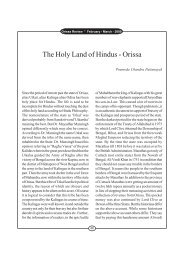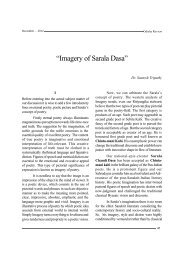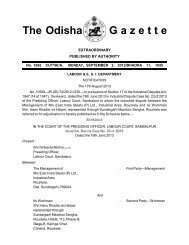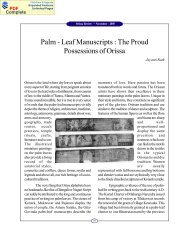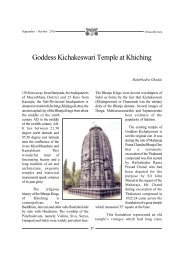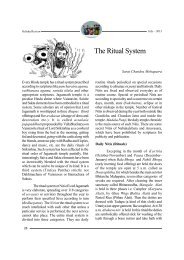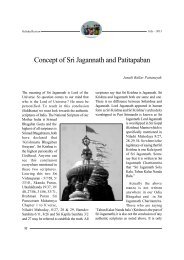Laxmi-Narayan Discord in Jagannath Religion
Laxmi-Narayan Discord in Jagannath Religion
Laxmi-Narayan Discord in Jagannath Religion
You also want an ePaper? Increase the reach of your titles
YUMPU automatically turns print PDFs into web optimized ePapers that Google loves.
Orissa Review * June - 2006<br />
<strong>Laxmi</strong>-<strong>Narayan</strong> <strong>Discord</strong> <strong>in</strong><br />
<strong>Jagannath</strong> <strong>Religion</strong><br />
The cult of Lord <strong>Jagannath</strong>a is an eclectic<br />
system. It has assimilated <strong>in</strong> its fold divergent<br />
religions. It is also <strong>in</strong>clusive of myriad creeds<br />
and manifold sects of the world. <strong>Jagannath</strong>a <strong>in</strong><br />
this sense is not a sectarian deity. The images<br />
of the <strong>Jagannath</strong>a triad do not approximate to<br />
the div<strong>in</strong>e forms of any known gods and<br />
goddesses of the<br />
H<strong>in</strong>du pantheon. Yet<br />
<strong>in</strong> the common belief<br />
of the devotees, Lord<br />
<strong>Jagannath</strong>a is<br />
identified by the<br />
name of <strong>Narayan</strong> and<br />
His chief consort by<br />
the name of<br />
Mahalaxmi. Like the<br />
enormity of the<br />
<strong>Jagannath</strong>a cult, His<br />
temple is also known by different names like<br />
'Badadeula', 'Nilachala', 'Srimandir' and so on.<br />
Every name, for all practical purposes, has a<br />
significance of its own. Of these names, the<br />
name of the temple as Srimandir is most<br />
popular among the devotees of the Almighty<br />
Lord. In this sense, Mahalaxmi is adored as<br />
the div<strong>in</strong>e proprietress of the sacred temple.<br />
As described <strong>in</strong> 'Durga Saptasati',<br />
Mahalaxmi is worshipped as the goddess of<br />
62<br />
Durga Madhab Dash<br />
wealth. She is the symbol of affluence and<br />
prosperity of the universe. Hav<strong>in</strong>g adopted <strong>in</strong><br />
herself all the mystic powers of Mahakali and<br />
Mahasaraswati, she is venerated <strong>in</strong> the temple<br />
as the primordial div<strong>in</strong>e force. In the belief of<br />
the devout Vaishnavites, the ma<strong>in</strong> protagonists<br />
of the <strong>Jagannath</strong>a religion, Mahalaxmi is the<br />
primary div<strong>in</strong>e force<br />
of the cosmic<br />
creation and<br />
therefore she is<br />
worshipped as one<br />
of the pr<strong>in</strong>cipal<br />
images <strong>in</strong> the<br />
<strong>Jagannath</strong>a temple.<br />
A number of<br />
festivals where<br />
Mahalaxmi is<br />
primarily <strong>in</strong>volved are celebrated <strong>in</strong> the temple<br />
of Lord <strong>Jagannath</strong>a. One such festival is the<br />
car festival of the Lords. The car festival,<br />
follow<strong>in</strong>g the universal import of <strong>Jagannath</strong>a<br />
cult, is not merely a function of the H<strong>in</strong>dus. It<br />
transcends all barriers of space and belief. It<br />
<strong>in</strong>volves multidimensional activities l<strong>in</strong>ked to<br />
many other rituals of the temple. Every such<br />
ritual is the expression of common human<br />
behaviour <strong>in</strong> our day-to-day life. The <strong>Laxmi</strong>-<br />
<strong>Narayan</strong> discord is one such function aris<strong>in</strong>g
out of the famous car festival of the Lords.<br />
This is observed <strong>in</strong> the temple on the twelfth<br />
day of the car festival. The discord is related<br />
to a dialogue between Mahalaxmi and<br />
<strong>Jagannath</strong>a. Countless devotees enjoy the ritual<br />
at the time of Lord's entry <strong>in</strong>to the temple after<br />
the Bahuda Yatra. As the ritual ensues,<br />
Mahalaxmi does not open the doors of the<br />
temple at the Jay -Vijaya entrance. <strong>Jagannath</strong>a,<br />
as a result, is stranded outside. Balabhadra is<br />
however taken <strong>in</strong>side the temple. He is as usual<br />
seated on the Ratnavedi, the div<strong>in</strong>e platform<br />
of Jewel. It is said, Mahalaxmi stoops to this<br />
action out of awful anguish. Her anger is<br />
caused due to the fact that she was not allowed<br />
to accompany <strong>Jagannath</strong>a dur<strong>in</strong>g the Gundicha<br />
Yatra, although the Lord took his sister,<br />
Subhadra <strong>in</strong> pomp and ceremony. Stranded<br />
outside, <strong>Jagannath</strong>a entreats Mahalaxmi to<br />
open the door of the entrance. He gives out<br />
several explanations <strong>in</strong> the forms of <strong>in</strong>sistent<br />
appeals. The flared outburst of Mahalaxmi and<br />
the humble appeals of <strong>Jagannath</strong>a Mahapravu<br />
thus constitute the <strong>Laxmi</strong> <strong>Narayan</strong> dialogue.<br />
This is an important ritual of the Temple. The<br />
dialogue is conta<strong>in</strong>ed <strong>in</strong> verse form. The ritual<br />
perta<strong>in</strong><strong>in</strong>g to the dialogue is celebrated <strong>in</strong> the<br />
temple for about an hour. Thereafter, with<br />
Mahalaxmi's permission, the doors of the<br />
temple are made ajar and the Lord is taken<br />
<strong>in</strong>side <strong>in</strong> a grand procession to adorn his seat<br />
on the div<strong>in</strong>e platform. This is the mystic<br />
background of the famous <strong>Laxmi</strong>-<strong>Narayan</strong><br />
dialogue.<br />
The purpose of this endeavor is to make<br />
a realistic study on this dialogue. An attempt<br />
is made here to present the gist of the dialogue<br />
<strong>in</strong> a prosaic order. Mahalaxmi flares her violent<br />
outbursts like an angry wife neglected by her<br />
husband. However harsh and rasp<strong>in</strong>g her<br />
outbursts may appear, they are symbolic of an<br />
Orissa Review * June - 2006<br />
63<br />
endear<strong>in</strong>g appeal to Lord <strong>Jagannath</strong>a. This is<br />
most common <strong>in</strong> the case of a wife <strong>in</strong> her lov<strong>in</strong>g<br />
and dutiful behaviour towards her husband. The<br />
display of her passionate conduct is all a fuss.<br />
In the end, it ultimately turns out as much ado<br />
about noth<strong>in</strong>g. The disharmony at last<br />
dissipates like the transient morn<strong>in</strong>g dews <strong>in</strong><br />
the usual passage of time. Mahalaxmi adapts<br />
herself to the ongo<strong>in</strong>g situation and f<strong>in</strong>ally w<strong>in</strong>s<br />
over her husband. This is wife and husband<br />
relationship <strong>in</strong> the usual go of life. This spirit<br />
is depicted <strong>in</strong> a picturesque way <strong>in</strong> the famous<br />
<strong>Laxmi</strong>-<strong>Narayan</strong> dialogue, full of realities <strong>in</strong><br />
filial behavior. The general theme of the<br />
dialogue, as followed <strong>in</strong> different parts of India,<br />
is almost the same. But the style and rhythm<br />
of the dialogue are different <strong>in</strong> different parts<br />
where the car festival is celebrated. The<br />
dialogue was once prevalent only <strong>in</strong> Oriya. But<br />
as th<strong>in</strong>gs now prevail, the dialogue is written<br />
<strong>in</strong> different languages. In some places, the ritual<br />
of <strong>Laxmi</strong>-<strong>Narayan</strong> dialogue is not at all<br />
observed. The images, after the Bahuda Yatra,<br />
are straightway taken to the sanctum sanctrum<br />
of the temple. The <strong>Laxmi</strong>-<strong>Narayan</strong> dialogue<br />
where it is <strong>in</strong> vogue, has been, by and large,<br />
formulated conform<strong>in</strong>g to the themes and<br />
contents of 'Deulatola' of Sisu Krushna Das,<br />
'Bramha Puran' and 'Skanda Puran', the sacred<br />
treatises on <strong>Jagannath</strong>a religion. In some<br />
places, the dialogue as published by Hari Arjun<br />
Company is also ceremoniously followed for<br />
observance of the ritual. The dialogue is always<br />
recited <strong>in</strong> verse form. But, the Ragas followed<br />
are different <strong>in</strong> different parts of Orissa.<br />
In the expressions of some devout poets<br />
of <strong>Jagannath</strong>a religion, the Lord's attitud<strong>in</strong>al<br />
disposition is not to the lik<strong>in</strong>g of the common<br />
people of the society. How can he neglect<br />
Mahalaxmi, his chief consort while mov<strong>in</strong>g out<br />
on the div<strong>in</strong>e sojourn ? The poets say,
Mahalaxim's presence <strong>in</strong> the Lord's chariot<br />
would have added to the glamour of the car<br />
festival.<br />
In Jagamohan Ramanyan, Matta<br />
Balaram Das, the eldest of the five illustrious<br />
devotees of the Panchasakha Age, describes<br />
this mystic sequence from the po<strong>in</strong>t of view of<br />
a common man's feel<strong>in</strong>gs. He says <strong>in</strong> a<br />
common man's voice, "Hay, Hari ! You didn't<br />
take Mahalaxmi while go<strong>in</strong>g on the div<strong>in</strong>e<br />
sojourn. Instead, you let your sister follow your<br />
gracious company. How could you do this, Oh,<br />
the most adored Lord ! Didn't you thereby ?<br />
dishonour your consort ? You appeared with<br />
Subhadra on the stone platform of Gundicha<br />
Ghar brav<strong>in</strong>g an unusual custom. Didn't you,<br />
my supreme Lord"?<br />
In Nila Sundar Gita, the devout poet,<br />
Sekhar Das while present<strong>in</strong>g the cosmic<br />
pastime of the Lord <strong>in</strong> Kaliyug has depicted<br />
the theme of the dialogue with a similar<br />
accusation through Arjun, the illustrious<br />
companion of the Lord <strong>in</strong> answer to several<br />
questions, brought forth by the latter <strong>in</strong> his<br />
perennial anxiety of gather<strong>in</strong>g wisdom. One<br />
such question perta<strong>in</strong>s to the Lord's neglect of<br />
Mahalaxmi, which from a common man's<br />
viewpo<strong>in</strong>t, is avowedly dishearten<strong>in</strong>g. Arjun<br />
says to Bhagawan, "Hey, Natabar ! My<br />
illustrious companion ! Are you aware of the<br />
general reaction of the people around you ?<br />
They disapprove your sojourn with Subhadra<br />
on the occasion of the car festival. Your<br />
consorts, Sridevi and Bhudevi, detest your<br />
action. Which also stands less prudent to my<br />
own conscience and to the conscience of your<br />
devotees." Arjun speaks out <strong>in</strong> this way<br />
disapprov<strong>in</strong>g the Lord's boisterous sojourn.<br />
In the poetic work known as "<strong>Laxmi</strong><br />
Naraya Kali" by Kali Charan Kabisurya of<br />
Orissa Review * June - 2006<br />
64<br />
Digapahandhi, district, Ganjam (Orissa),<br />
<strong>Jagannath</strong> proffers a fitt<strong>in</strong>g explanation <strong>in</strong> this<br />
regard. The Lord says to Mahalaxmi, "Hey,<br />
Devi ! Isn't it the fact that you are the div<strong>in</strong>e<br />
proprietress of the temple ? In fact, you look<br />
after the rout<strong>in</strong>e rites of the peripheral deities<br />
of the temple. If you go out, the rites of the<br />
temple will be <strong>in</strong> an awful shambles. How can<br />
then you move with me ? Hey, Devi ! You are<br />
Chanchala <strong>in</strong> your action and usual behaviour.<br />
Th<strong>in</strong>k for a while; can you rema<strong>in</strong> with me <strong>in</strong><br />
the Adap for so many days at a stretch ?<br />
Indeed a very cogent and <strong>in</strong>controvertible<br />
explanation ! Mahalaxmi has all knowledge<br />
about the rationale of the Lord's explanation.<br />
But she is not prepared to admit it as a<br />
justifiable reason<strong>in</strong>g. After all, she is the Lordly<br />
consort of <strong>Jagannath</strong>a and, for that reason; she<br />
is to exert her dom<strong>in</strong>eer<strong>in</strong>g control on her<br />
beloved Lord ! This is the spirit of the entire<br />
altercation <strong>in</strong> the <strong>Laxmi</strong>-<strong>Narayan</strong> discord. The<br />
devout poets of <strong>Jagannath</strong>a religion have<br />
viewed this episode from their own visionary<br />
appreciations. But everywhere <strong>in</strong> Orissa, where<br />
the car festival is observed, the theme of the<br />
episode is one and the same.<br />
Thus, the Lord, unm<strong>in</strong>dful of other<br />
people's reactions, is bent upon his own<br />
decision. And the Lord f<strong>in</strong>ally goes out <strong>in</strong> his<br />
div<strong>in</strong>e mission as per his own plan. It is <strong>in</strong> this<br />
background of facts that the car festival beg<strong>in</strong>s.<br />
The Lord at last reaches the Gundicha<br />
Temple, accompanied by his elder brother,<br />
Balabhadra, his sister Subhadra and the cosmic<br />
weapon, "Sudarsan". The images are then taken<br />
from the chariots <strong>in</strong> a div<strong>in</strong>e procession and<br />
f<strong>in</strong>ally alighted on the stone platform of the<br />
Gundicha temple. The festival cont<strong>in</strong>ues here<br />
for a period of long seven days.
On the Herapanchami day, Mahalaxmi<br />
after pay<strong>in</strong>g her obeisance to Nilamadhaba, the<br />
mov<strong>in</strong>g idol of Lord <strong>Jagannath</strong>a, leaves the<br />
massive temple and proceeds to Gundicha<br />
Mandir to have the 'darshan' of the Lords on<br />
the stone platform. However, her ma<strong>in</strong> purpose<br />
is to <strong>in</strong>vite <strong>Jagannath</strong>a Mahaprabhu back to his<br />
div<strong>in</strong>e abode soon. Mahalaxmi travels <strong>in</strong> a<br />
palanqu<strong>in</strong> <strong>in</strong> a grand procession. As she reaches<br />
the place where "Nandighosa", the chariot of<br />
the Lord, is parked, some Servitor-Daitapaties<br />
come along from the Gundicha Temple to the<br />
palanqu<strong>in</strong> of Mahalaxmi <strong>in</strong> a similar grand<br />
procession and offer their scared obeisance<br />
while receiv<strong>in</strong>g Mahalaxmi on her way. The<br />
servitors perform this ritual as the emissaries<br />
of the Lord. Mahalaxmi is thus taken <strong>in</strong>to the<br />
temple where the Lords are worshipped.<br />
Thereafter, a different rite takes place <strong>in</strong><br />
Gundicha Temple. Mahalaxmi's palanqu<strong>in</strong> is<br />
brought near the Gundicha pillar <strong>in</strong> front of<br />
the ma<strong>in</strong> entrance of the temple. Here, goddess<br />
Mahalaxmi, after pay<strong>in</strong>g her obeisance, <strong>in</strong>vites<br />
the Lords to come back to their div<strong>in</strong>e abode.<br />
In a Sanskrit verse of Ka1i Charan Kabi surya,<br />
Mahalaxmi's <strong>in</strong>vitation to the Lords is nicely<br />
depicted. Mahalaxmi says, "Oh, the great<br />
Lord ! The four armed cosmic Div<strong>in</strong>e ! Be<br />
gracious enough to come back to the grand<br />
temple with your worshipful elder brother and<br />
lov<strong>in</strong>g sister. You have stayed away from the<br />
temple for a long time. I have personally come<br />
over here to extend my warm <strong>in</strong>vitation. In your<br />
absence, the temple looks vacant."<br />
As the ritual next follows, Lord<br />
<strong>Jagannath</strong>a, hav<strong>in</strong>g gracefully acknowledged<br />
the <strong>in</strong>vitation, sends out through his servitors<br />
one of the garlands adorn<strong>in</strong>g his exalted self.<br />
Mahalaxmi receives the garland known as"<br />
Ajnya Mala" of the Lord <strong>in</strong> expression of her<br />
deep love and profound graciousness. Just<br />
Orissa Review * June - 2006<br />
65<br />
thereafter, the ritual of offer<strong>in</strong>g "prasad" is<br />
celebrated. The servitors now fasten the holy<br />
cloth known as 'Tera' on the entrance of the<br />
Temple. Gratified with the Lords' fabulous<br />
large heartedness, Mahalaxmi returns to the<br />
temple through Hera Gouri Street. This is how<br />
the ritual of Hera Panchami is performed <strong>in</strong><br />
the Gundicha Temple dur<strong>in</strong>g the car festival<br />
period.<br />
On the n<strong>in</strong>th day, the Lords resume their<br />
back journey to the ma<strong>in</strong> temple. This is known<br />
as Bahuda Yatra of Lord <strong>Jagannath</strong>a. When<br />
the three chariots are halfway through,<br />
Mahalaxmi, extraord<strong>in</strong>arily euphoric, appears<br />
on the Bhog Mandap of the ma<strong>in</strong> temple and<br />
steals a glance of the chariots mov<strong>in</strong>g along<br />
towards the grand temple. In the process of<br />
this ritual, the idol of Mahalaxmi is taken out<br />
<strong>in</strong> a procession, conducted by Gajapati<br />
Maharaj, to the chariot of the Lord <strong>Jagannath</strong>a.<br />
Here aga<strong>in</strong>, she welcomes the Lords.<br />
<strong>Jagannath</strong>a as usual offers her a garland-<br />
"Ajnya Mala" -as a mark of his earnest concern.<br />
After the sacred observance of the ritual,<br />
Mahalaxmi moves back to the temple. As the<br />
three chariots <strong>in</strong> the usual process reach the<br />
Lions Gate of the temple, Mahalaxmi aga<strong>in</strong><br />
appears on the' Chahani Mandap' to confirm<br />
that the Lords have arrived near the entrance<br />
of the massive temple. Everyth<strong>in</strong>g is alright so<br />
far. Hav<strong>in</strong>g reached the Lion's Gate, the Lords<br />
give their audience to the eager devotees. The<br />
servitors perform some more rites over here,<br />
while the Lords and Subhadra are still seated<br />
<strong>in</strong> their respective chariots. The ritual of Sayana<br />
Ekadasi is observed dur<strong>in</strong>g this period. The<br />
Lords and Subhadra are then taken to the<br />
temple. Mahalaxmi's expectations are outraged<br />
dur<strong>in</strong>g this period. She expected the Lords back<br />
to the sanctum sanctorum soon after their<br />
arrival at the Lion's gate. The delay caused <strong>in</strong>
the process of various ritualistic observances<br />
is unbearable to the self-conceited and<br />
impatient Mahalaxmi. So she denies the entry<br />
of the <strong>Jagannath</strong>a Mahaprabhu <strong>in</strong> to the<br />
sanctum sanctorum out of anguish as narrated<br />
above. The Lord, by now, is quite aware of<br />
his own slip-ups. He expla<strong>in</strong>s his predicament<br />
and the circumstances lead<strong>in</strong>g to the delay <strong>in</strong><br />
his arrival <strong>in</strong> the temple.<br />
Accord<strong>in</strong>g to the dialogue prevalent <strong>in</strong><br />
North Orissa, Mahalaxmi, hear<strong>in</strong>g the voice<br />
of <strong>Jagannath</strong>a, orders her maidservant to close<br />
the door of the entrance at the Jaya-Vijaya gate.<br />
She orders "Hey, Sakhi !, listen. I hear the voice<br />
of the Lord outside. It appears, he has arrived<br />
<strong>in</strong> the temple now. You move forth and close<br />
the door of the entrance. The Lord should not<br />
be allowed to enter the sanctum sanctorum.<br />
Let him rema<strong>in</strong> outside.<br />
However, Mahalaxmi before giv<strong>in</strong>g this<br />
order allows Badathakur to enter the sanctum<br />
of the temple. After all, he is her elder brother<strong>in</strong>-law.<br />
How can she disrespect his elderly<br />
self ? This sequence has been beautifully<br />
described <strong>in</strong> the <strong>Laxmi</strong>-<strong>Narayan</strong> dialogue<br />
published by Hari Arjuna Company. As per<br />
the relevant verse on this score, Mahalaxmi<br />
says to her maid servant, "Listen Sakhi ! Let<br />
my elder brother-<strong>in</strong>-law enter the temple. But<br />
the black hued Lord should stand outside and<br />
get drenched <strong>in</strong> ra<strong>in</strong>".<br />
Hear<strong>in</strong>g all this, the Lord, stands outside<br />
like an unfortunate offender. To appease her<br />
<strong>in</strong>furiated consort, the Lord speaks <strong>in</strong> the next<br />
verse of the same dialogue, "Oh, the lotus eyed,<br />
the daughter of the ocean, open the door of the<br />
entrance; I am immensely distressed. Show me<br />
your splendorous face and mitigate my distress.<br />
I have brought for you this gorgeous piece of<br />
chitrameghi silk. This, I believe, will best suit<br />
Orissa Review * June - 2006<br />
66<br />
your fair complexion. Mahalaxmi is least<br />
moved by his cajolery words. She replies<br />
say<strong>in</strong>g, "I do not like to hear your words of<br />
encomium. Hey, Niladribihari, go away from<br />
the temple now; go away with your lov<strong>in</strong>g<br />
sister. If you leave the daughter of Nandaraj<br />
alone, she will be forlorn and greatly distressed.<br />
See the face of your <strong>in</strong>corrigible sister; she has<br />
no mark of honour <strong>in</strong> her face. Don't you know,<br />
how she moved out first and mounted the<br />
chariot on her own? She is like a way-ward<br />
cow entirely unmanageable. She cannot correct<br />
her behaviour even if she is admonished for<br />
her aberrant ways."<br />
Subhadra does not m<strong>in</strong>d the pierc<strong>in</strong>g<br />
words of her self-conceited sister-<strong>in</strong>-law. After<br />
all, she is like her own mother <strong>in</strong> the l<strong>in</strong>e of<br />
respectable relationship ? But lo ! To the Lord<br />
himself, all those were serious aspersions.<br />
Mahalaxmi aga<strong>in</strong> says, "Oh, Lord! The<br />
way you behave is your strange style of<br />
mannerism. I know, you cannot mend your<br />
manners. This is what your caste has actually<br />
taught you over all these years. Hav<strong>in</strong>g stayed<br />
<strong>in</strong> Gopapura for long, you have picked up<br />
many unusual habits and the one, you exhibit<br />
now, is the display of your obsessive m<strong>in</strong>d".<br />
The Lord still ma<strong>in</strong>ta<strong>in</strong>s his calm. He<br />
swallows all her aspersions without a word of<br />
reaction. He does not m<strong>in</strong>d what his consort<br />
says. In defence he only proffers his<br />
explanation cozily try<strong>in</strong>g to conv<strong>in</strong>ce<br />
Mahalaxmi on the po<strong>in</strong>ts of his own<br />
submission.<br />
In the words of the devotee-poet, Sridhar<br />
Das, this is be the go of life <strong>in</strong> the deal<strong>in</strong>gs<br />
between a husband and his wife. The quality<br />
of adaptability is the s<strong>in</strong>e-qua-non of a happy<br />
married life <strong>in</strong> household relationship. When<br />
the wife is <strong>in</strong>transigent, the husband should be
flexible and calm go<strong>in</strong>g and adjust himself to<br />
the disparag<strong>in</strong>g situation.<br />
Now, undisturbed despite the cont<strong>in</strong>u<strong>in</strong>g<br />
acrimony, the Lord as depicted <strong>in</strong> the Brahma<br />
Puran, makes an appeal to Mahalaxmi, "Hey,<br />
Devi ! As you know, <strong>in</strong> Satya Yuga,<br />
Indrayumna built the temple. He was the fifth<br />
descendant of Lord Bhama. He consecrated<br />
our images on the Ratna Vedi <strong>in</strong> all devotion.<br />
His queen Gundicha was no less a devotee of<br />
m<strong>in</strong>e. Satisfied with their devotion, I called<br />
upon them to ask for a boon each. You know<br />
very well, Indradyumna <strong>in</strong>itially did not ask<br />
for any boon. After all he was an <strong>in</strong>v<strong>in</strong>cible<br />
emperor. He was not <strong>in</strong> want of anyth<strong>in</strong>g <strong>in</strong><br />
his world. Why should he need a boon from<br />
me ? However, when I persisted <strong>in</strong> my wishful<br />
bless<strong>in</strong>gs, the k<strong>in</strong>g said that if I still <strong>in</strong>sisted,<br />
the boon should be such that, after him, there<br />
should be no survivor <strong>in</strong> his dynasty to claim<br />
the temple as his own. Indeed ! A stupendous<br />
boon ! The queen was flabbergasted at the<br />
k<strong>in</strong>g's flamboyance. She had no other<br />
alternative. And so, adopt<strong>in</strong>g me as his son,<br />
she wanted me to make a commitment, that I<br />
should, once <strong>in</strong> a year, visit, her place and this<br />
visit shall, <strong>in</strong> future, be known as Gundicha<br />
Yatra after her name. In compliance of her<br />
wish, I am committed to visit Gundicha Temple<br />
once <strong>in</strong> every year as you know very well. So,<br />
Oh, Devi ! You should not misunderstand me<br />
for my car festival, which is sacredly tied to a<br />
div<strong>in</strong>e commitment. This version is also<br />
<strong>in</strong>cluded <strong>in</strong> the Deula Tola of Sisu Krishna Das.<br />
Now, the Lord's submission to<br />
Mahalaxmi, as described <strong>in</strong> the lyric is of some<br />
Bachanikas prevail<strong>in</strong>g <strong>in</strong> the ex-zamidari areas<br />
of Ganjam district is considerably<br />
overwhelm<strong>in</strong>g. The Lord says, "Hey, Devi !<br />
have I ever deviated from my words of<br />
Orissa Review * June - 2006<br />
67<br />
commitment s<strong>in</strong>ce then? Why then you<br />
po<strong>in</strong>tlessly exhibit your fury on the flimsiest<br />
grounds ? While mov<strong>in</strong>g along <strong>in</strong> my usual<br />
elegance <strong>in</strong> the div<strong>in</strong>e procession of the festival,<br />
I admit, I might have delayed <strong>in</strong> go<strong>in</strong>g to the<br />
temple. But I confess my embarrass<strong>in</strong>g<br />
<strong>in</strong>discretion. So now be pleased to open the<br />
door and I enter sanctum sanctorum without<br />
any further fuss <strong>in</strong> the cont<strong>in</strong>u<strong>in</strong>g<br />
misunderstand<strong>in</strong>g.<br />
In the same lyrical presentation, the Lord<br />
cont<strong>in</strong>ues, "Hey, Indirey ! My beloved, the<br />
div<strong>in</strong>e benefactress of all devotees <strong>in</strong> this world,<br />
irrespective of caste, creed and religion; you<br />
visit the places of your devotees with a spirit<br />
of enormous compassion. In the same spirit, I<br />
set off on my div<strong>in</strong>e sojourn only once <strong>in</strong> a<br />
year to give audience to my devotees and to<br />
avenge their sorrows and atone their s<strong>in</strong>s. Hey,<br />
Indirey ! My div<strong>in</strong>e sojourn is not for any other<br />
reason. Still, if you do not open the door, I<br />
shall go back to Adap (Gundicha Temple) and<br />
live there forever."<br />
Mahalaxmi knows very well that the<br />
Lord cannot leave the temple under any<br />
circumstance. He has a bigger commitment to<br />
live here and give his audience to the demigods<br />
and his devotees every day. She is aware<br />
of all the div<strong>in</strong>e responsibilities of the Lord <strong>in</strong><br />
his own temple. So, she least bothers about his<br />
cautionary remarks. Feign<strong>in</strong>g her <strong>in</strong>dignation<br />
further, she cont<strong>in</strong>ues to say, "It is alright that<br />
you set off on your div<strong>in</strong>e mission. But why<br />
did you leave me alone ? You may or may not<br />
say; but I know the reason. In the name of the<br />
festival, you went out to meet the cowherd<br />
women with whom, as the world says, you<br />
are <strong>in</strong> deep love <strong>in</strong> actual dispensation.<br />
A strange accusation ! She dubs the Lord<br />
as immoral <strong>in</strong> his disposition. In fact, this is
the type of accusation, a wife usually hurls at<br />
her husband when there is slightest<br />
misunderstand<strong>in</strong>g <strong>in</strong> the heedful attention of<br />
the latter. Mahalaxmi reflects a common<br />
women's sentiment. Whatever be the religious<br />
implication of the <strong>Laxmi</strong>-<strong>Narayan</strong> dialogue, it<br />
is the mirror of a common women's usual<br />
reaction to her husband when there is slightest<br />
neglect on the part of the latter. The accusation<br />
of the wife may appear to be harsh and<br />
damag<strong>in</strong>g. But one th<strong>in</strong>g is sure that, <strong>in</strong> every<br />
such accusation, the wife has the flair to<br />
highlight the enormity of her husband's<br />
greatness. This is romanticism <strong>in</strong> the<br />
mean<strong>in</strong>gful layout of a negative disposition.<br />
As depicted <strong>in</strong> the dialogue prevalent <strong>in</strong><br />
some places, Mahalaxmi says to <strong>Jagannath</strong>a,<br />
"Oh, the crown potentate of deceivers and<br />
tricksters, go back to the cowherd women of<br />
Gopapura; they may be wait<strong>in</strong>g for you. If you<br />
hold up, they may be angry with you. Hey,<br />
Muralidhar ! You have looted their love; you<br />
have looted their all with the captivat<strong>in</strong>g note<br />
of your magic flute. How w<strong>in</strong>some your potent<br />
fluit is ! Even Brahma and Siva are captivated<br />
by its wondrous sound. You have brought for<br />
me many gifts, as you say. Give them to Radha;<br />
She will be very happy to receive them from<br />
your div<strong>in</strong>e self".<br />
Hav<strong>in</strong>g exhausted all her anguish through<br />
several blames, Mahalaxmi gradually calms<br />
down. As described <strong>in</strong> the dialogue published<br />
by Hari Arjun Campany, Badathakur at last<br />
Orissa Review * June - 2006<br />
68<br />
<strong>in</strong>tervenes <strong>in</strong> the div<strong>in</strong>e altercation. He speaks<br />
out to Mahalaxmi, while enjoy<strong>in</strong>g the<br />
transcendental situation, "Hey Bhadre ! if my<br />
brother, <strong>Jagannath</strong>a is a wrongdoer for lapses,<br />
if any, I too am not free from your accusation.<br />
Our darl<strong>in</strong>g Subhadra accompanied us because<br />
of the candid wish of both the brothers and not<br />
of <strong>Jagannath</strong>a alone. Subhadra cannot rema<strong>in</strong><br />
without her brothers. And so, you were left <strong>in</strong><br />
the temple for the genu<strong>in</strong>e reason best known<br />
to you. After all, you are the div<strong>in</strong>e proprietress<br />
of the grand temple. M<strong>in</strong>d not my brother's<br />
mistake, if any. Now open the door and let my<br />
brother enter the sanctum of the temple." With<br />
these words of Badathakura, the arrogance of<br />
Mahalaxmi breaks down like bubbles on the<br />
surface of water. Mahalaxmi now comes<br />
forward and offers the sacred light to her Lord.<br />
She f<strong>in</strong>ally receives the Lord at the Jaya-Vijaya<br />
Gate. And all the images are at last seated on<br />
the Ratna Vedi, the platform of Jewel as before.<br />
Now, there is ululation all around <strong>in</strong> the<br />
temple. The devotees say "Haribole" at the<br />
pitch of their voice. In the midst of drums,<br />
cymbals and other musical <strong>in</strong>struments<br />
blow<strong>in</strong>g, the ritual of <strong>Laxmi</strong> <strong>Narayan</strong><br />
Bachanika is ceremoniously concluded.<br />
Durga Madhab Dash lives at C-80, Palasapalli,<br />
Bhubaneswar.




